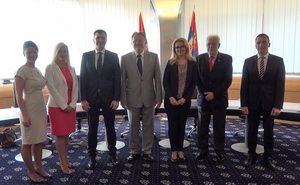 The Minister of Labour, Employment, Veteran and Social Affairs Zoran Đorđević, the Minister of Finance Dušan Vujović and the Manager of the Social Inclusion and Poverty Reduction Unit Ivan Sekulović, together with civil society representatives gathered within the National Convention on the European Union, signed the Platform for Monitoring the Implementation of the Economic Reform Programme 2018-2020 (ERP) and the Employment and Social Reform Programme (ESRP) on 12 September 2017. This enabled the establishment of the model for cooperation between public institutions and the civil sector which would be used in the process of development and implementation of these strategic documents.
The Minister of Labour, Employment, Veteran and Social Affairs Zoran Đorđević, the Minister of Finance Dušan Vujović and the Manager of the Social Inclusion and Poverty Reduction Unit Ivan Sekulović, together with civil society representatives gathered within the National Convention on the European Union, signed the Platform for Monitoring the Implementation of the Economic Reform Programme 2018-2020 (ERP) and the Employment and Social Reform Programme (ESRP) on 12 September 2017. This enabled the establishment of the model for cooperation between public institutions and the civil sector which would be used in the process of development and implementation of these strategic documents.
After the signing, the Minister of Labour, Employment, Veteran and Social Affairs Zoran Đorđević, the Minister of Finance Dušan Vujović and the Head of Delegation of the European Union to the Republic of Serbia Sem Fabrizi, attended the introductory meeting for the preparation of the Economic Reform Programme (ERP) 2018-2020. This meeting represented the official beginning of the fourth cycle of preparation of the ERP 2018-2020 document, based on the Guidelines for Development presented by the European Commission in May of this year in Brussels, and the ECOFIN Council Recommendations also form May of this year.
The main topics of the meeting were the presentation of the new cycle of preparation of the ERP along with its content, dynamics and deadlines, the innovations within the European Commission Guidelines for its implementation, the experiences from previous collaborations with the Organisation for Economic Co-operation and Development (OECD), and the progress of the cooperation with the civil society.
The Ministers Mr Đorđević and Mr Vujović, together with the civil society representatives gathered within the National Convention on the European Union, signed the Platform for Monitoring the Implementation of the Economic Reform Programme 2018-2020 (ERP) and the Employment and Social Reform Programme (ESRP), thus continuing the established model of cooperation between public institutions and the civil society within the preparation of this strategic document. The inclusion of civil society organizations increases the social consensus in defining public policies and raises the level of understanding of the effects of certain policies, which further facilitates their implementation.
The meeting was also attended by the representatives of the National Bank of Serbia, the Public Policy Secretariat of the Republic of Serbia, line ministries, civil society organisations gathered within the National Convention on the European Union, the Delegation of the European Union in Belgrade, and the OECD.
As a reminder: the ERP is a document which Serbia, as the candidate country for the EU membership, prepares annually. This document contains a medium-term macroeconomic and fiscal policy framework, as well as concrete priority structural reforms. In line with the European Commission guidelines, the structural reforms under the previous ERP 2017-2019 were divided into nine key areas: public finance management; energy, transport and telecommunications market; sectoral development; business environment and reduction of the informal economy; research and innovation; external trade and investment facilitation; education and skills; employment and labour markets; social inclusion, poverty reduction and equal opportunities.
More information can be found at www.minrzs.gov.rs
 Government of the Republic of Serbia
Government of the Republic of Serbia















 pdf [271 KB]
pdf [271 KB]
Leave a Comment